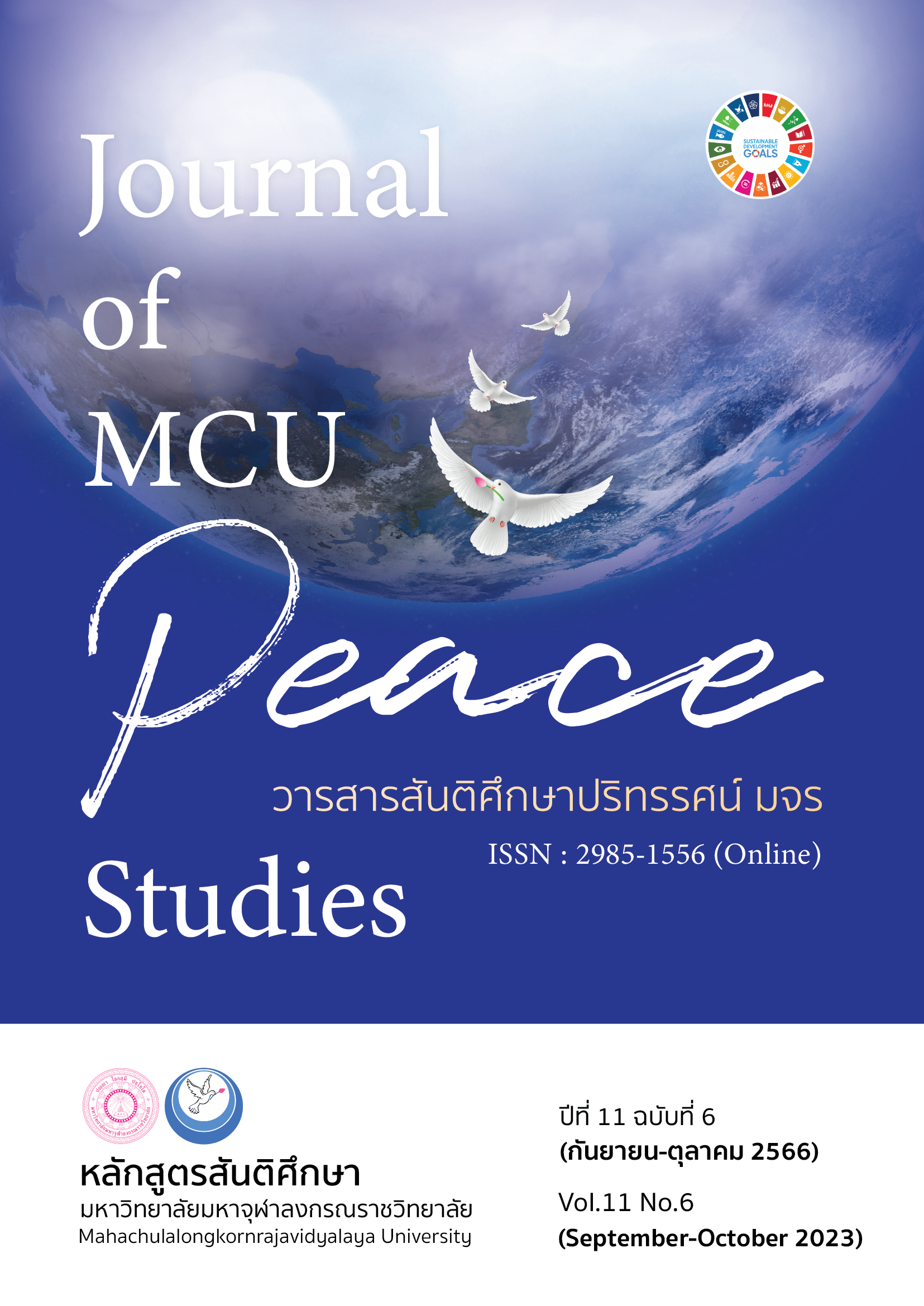การประยุกต์ใช้ระบบการวางแผนทรัพยากรองค์กรที่มีอิทธิพลต่อการได้เปรียบทางการแข่งขันของผู้ประกอบการในกลุ่มอุตสาหกรรมผลิตชิ้นส่วนยานยนต์ไทย
Main Article Content
บทคัดย่อ
บทความวิจัยมีวัตถุประสงค์เพื่อศึกษาอิทธิพลของการประยุกต์ใช้ระบบการวางแผนทรัพยากรองค์กรที่มีต่อความรวดเร็วในการผลิต เพื่อศึกษาอิทธิพลของการประยุกต์ใช้ระบบการวางแผนทรัพยากรองค์กรที่มีต่อประสิทธิภาพองค์กรของผู้ประกอบการในกลุ่มอุตสาหกรรมผลิตชิ้นส่วนยานยนต์ไทย และเพื่อตรวจสอบ ความสอดคล้องของตัวแบบการประยุกต์ใช้ระบบการวางแผนทรัพยากรองค์กรที่มีอิทธิพลต่อความรวดเร็ว ในการผลิต ประสิทธิภาพองค์กร และการได้เปรียบทางการแข่งขันของผู้ประกอบการในกลุ่มอุตสาหกรรม ผลิตชิ้นส่วนยานยนต์ไทย การวิจัยในครั้งนี้เป็นการวิจัยแบบผสานวิธี เป็นการวิจัยที่ใช้วิธีวิทยาแบบผสมผสานแบบแผนขั้นตอนเชิงสำรวจ โดยใช้การศึกษาข้อมูลเชิงคุณภาพด้วยการสัมภาษณ์เชิงลึกผู้ให้ข้อมูลหลัก จำนวน 7 ราย และการศึกษาในเชิงปริมาณเก็บรวบรวมข้อมูลด้วยแบบสอบถามจากผู้ปฏิบัติงานในสถานประกอบการผู้ผลิตชิ้นส่วนยานยนต์ไทยกําหนดขนาดกลุ่มตัวอย่าง ตามเกณฑ์ของ แฮรี่ และคนอื่นๆ จำนวน 536 ราย โดยใช้วิธีสุ่มแบบสะดวก วิเคราะห์ข้อมูลด้วยการวิเคราะห์ตัวแบบจำลองสมการโครงสร้าง
ผลการวิจัยพบว่า แบบจำลองสมการโครงสร้างมีความสอดคล้องกับข้อมูลเชิงประจักษ์ (Chi-square = 106.268, df = 97, Chi-square / DF = 1.096, GFI = 0.979, CFI = 0.998, RMSEA = 0.013) โดยผลการศึกษาพบว่า 1) การประยุกต์ใช้ระบบการวางแผนทรัพยากรองค์กร มีอิทธิพลในเชิงบวกต่อความรวดเร็วในการผลิต (0.90) ประสิทธิภาพขององค์กร (0.38) และการได้เปรียบทางการแข่งขันของผู้ประกอบการ (0.32) และ 2) ความรวดเร็วในการผลิตมีอิทธิพลในเชิงบวกต่อประสิทธิภาพขององค์กร (0.48) และประสิทธิภาพขององค์กรมีอิทธิพลต่อการได้เปรียบการแข่งขันของผู้ประกอบการ (0.38) ดังนั้นการประยุกต์ใช้ระบบการวางแผนทรัพยากรองค์กรจึงมีบทบาทสำคัญต่อการขับเคลื่อนประสิทธิภาพขององค์กร และการได้เปรียบทางการแข่งขันของผู้ประกอบการในกลุ่มอุตสาหกรรมผลิตชิ้นส่วนยานยนต์ไทย
Article Details

อนุญาตภายใต้เงื่อนไข Creative Commons Attribution-NonCommercial-NoDerivatives 4.0 International License.
ทัศนะและความคิดเห็นที่ปรากฏในบทความในวารสาร ถือเป็นความรับผิดชอบของผู้เขียนบทความนั้น และไม่ถือเป็นทัศนะและความรับผิดชอบของกองบรรณาธิการ ยินยอมว่าบทความเป็นลิขสิทธิ์ของวารสาร
เอกสารอ้างอิง
Ali, M., Nasr, E., & Gheith, M. H. (2017). Benefits and Challenges of Cloud ERP Systems - A Systematic Literature Review. Future Computing and Informatics Journal, 1(1), 1-9.
AL-Qudah, H. S. S. (2020). Impact of Moral & Material Incentives on Employee’s Performance; An Empirical Study in Private Hospitals at Capital Amman. International Business Research, 9(11), 222-234.
Beheshti et al. (2014). Selection and Critical Success Factors in Successful ERP Implementation. Competitiveness Review, 24(4), 358-375.
Boonsin, S. (2017). Human Resource Management. Chiang Mai: Research Administration Center Chiang Mai University.
Ellran, L. M., & Cooper, M. C. (2014). Supply Chain Management: It's All about the Journey, Not the Destination. Journal of Supply Chain Management, 50(1), 1-29.
Fan, G. G. Z. (2018). Customized Manufacturing Enterprise Resource Planning System for Offsite Modular Light Gauge Steel Construction. (Master's Thesis). University of Alberta. Cannada.
Iyer, A., Saranga, H., & Seshadri, S. (2013). Effect of Quality Management Systems and Total Quality Management on Productivity Before and After: Empirical Evidence from the Indian Auto Component Industry. Production and Operations Management, 22(2), 283-301.
Laonant, S. (2013). Organization Development. (2nd ed.). Bangkok: DD Bookstore.
Papula, J., & Volna, J. (2013). Core Competence for Sustainable Competitive Advantage. Multidisciplinary Academic Research, Praha: MAC Prague Consulting.
Priyono, A., Idris, F., & Abdul Halim Lim, S. B. (2020). Achieving Ambidexterity in Internationalization: Analysis of How SMEs Cope with Tensions between Organizational Agility–Efficiency. Journal of Open Innovation: Technology, Market, and Complexity, 6(4), 1-19.
Prueksatawan, C. (2011). Factors Affecting Employees' Acceptance of SAP System in Electrical and Electronic Plastic Parts Manufacturing Industry. (Master's Thesis). Thammasat University. Bangkok.
Qin, J., Liu, Y., & Grosvenor, R. (2016). A Categorical Framework of Manufacturing for Industry 4.0 and Beyond. Procedia CIRP, 52, 173-178.
Saha, N., Gregar, A., & Sáha, P. (2017). Organizational Agility and HRM Strategy: Do They Really Enhance Firms’ Competitiveness? International Journal of Organizational Leadership, 6(3), 323-334.
Salkin, C., Oner, M., Ustundag, A., & Cevikcan, E. (2018). A Conceptual Framework for Industry 4.0. in Pham, D. T. (Ed.), Industry 4.0 Managing the Digital Transformation (3-23). Birmingham, UK: Springer Series in Advanced Manufacturing.
Samsir, S. (2018). The Effect of Leadership Orientation on Innovation and Its Relationship with Competitive Advantages of Small and Medium Enterprises in Indonesia. International Journal of Law and Management, 60(2), 530-542.
Singsatorn, P., & Chansom, N. (2021). Guidelines in Selecting Enterprise Resource Planning System for Human Resource Management: The Case Study of OGAS Solutions (Thailand) Company Limited. Rajapark Journal, 15(42), 262-273.
Stair, R. M., & Reynolds, G. W. (2010). Principles of Information Systems a Managerial Approach. Boston: Course Technology.


